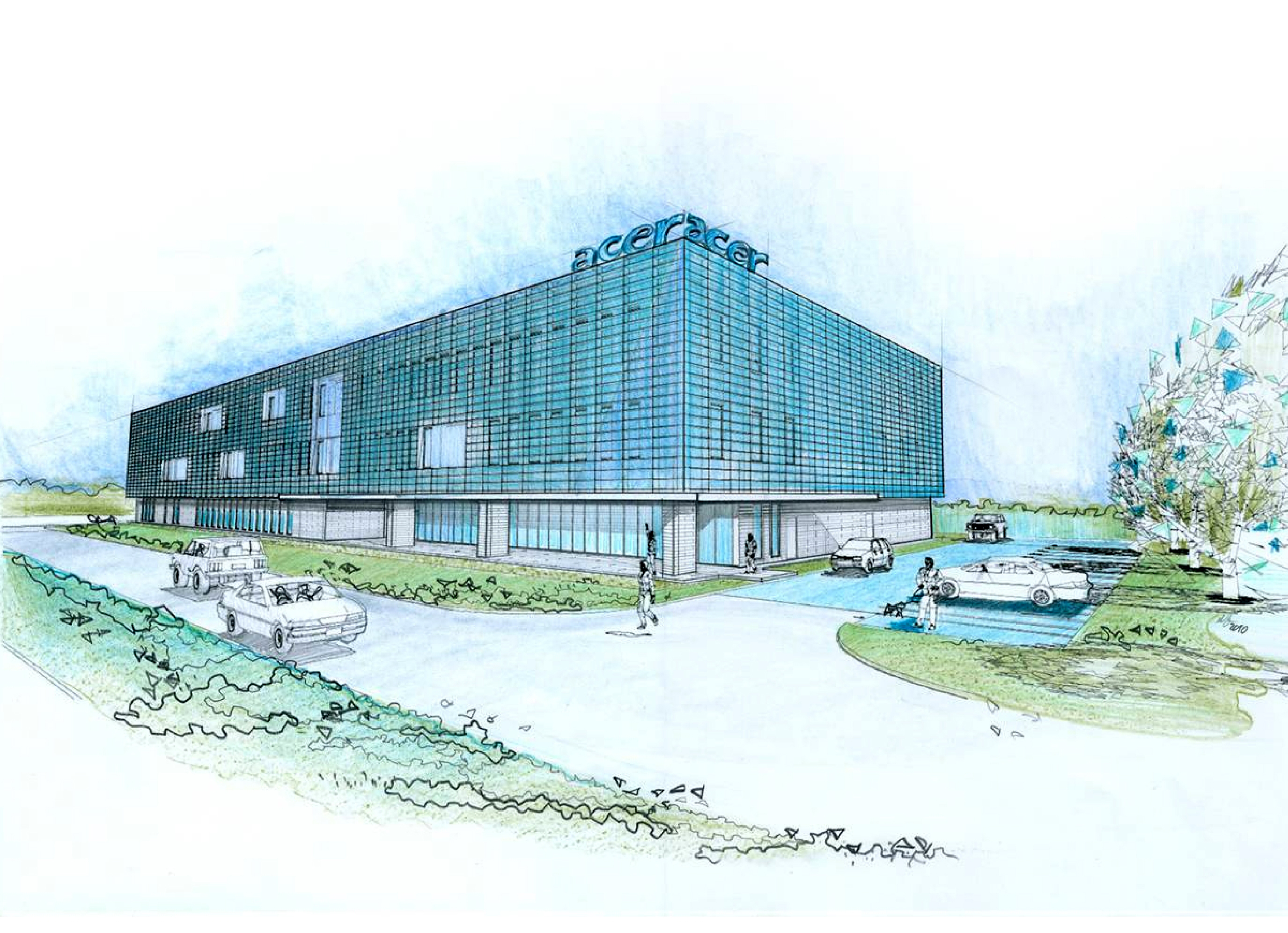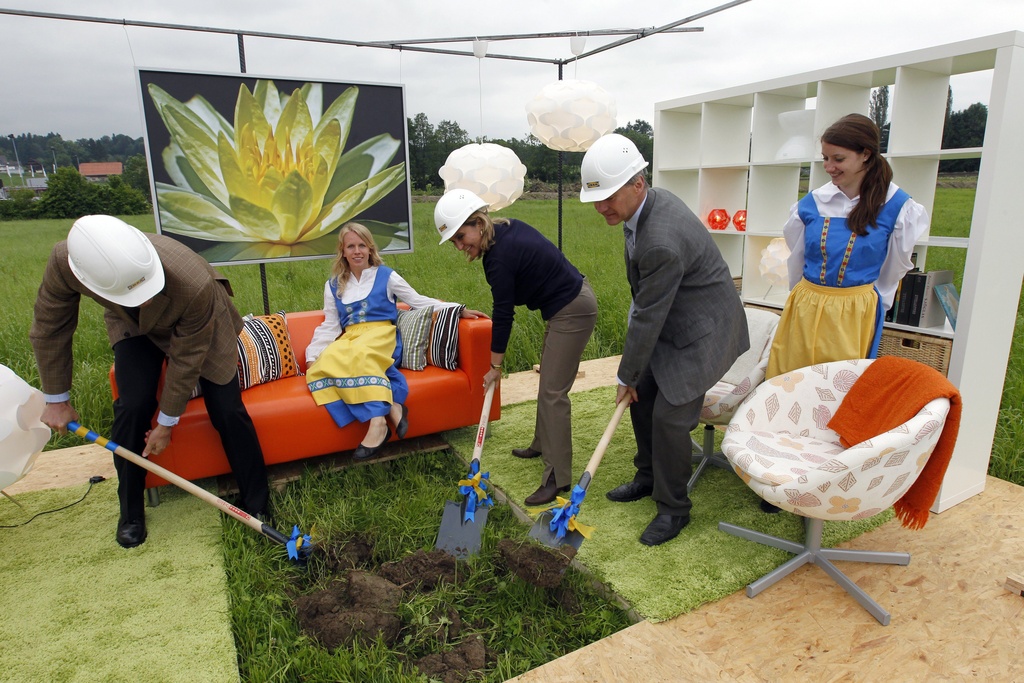Rolle wrestles with impact of recent growth

The pretty lakeside village of Rolle, located midway between Geneva and Lausanne, is experiencing growing pains as it manages its ongoing economic boom.
swissinfo.ch visited Rolle to find out how the influx of international firms has transformed the local community, which nestles between the lake and rolling vineyards in western Switzerland.
From the motorway you cannot miss the row of shiny new buildings belonging to Chiquita, Nissan, Yahoo! and other big-name firms that have set up shop at Rolle’s A-One Business Park over the past five years.
“We have 40,000 square metres of office space for the 13 firms currently based here who employ between 1,200-1,600 people. We’re negotiating with numbers 14 and 15,” A-One director Daniel Lord told swissinfo.ch. “And it’s moving on. There is still attractiveness in the site from a tax point of view. We’re still talking with canton Vaud who have incentives.”
Ineos is the most recent arrival in Rolle. The giant chemical manufacturer inaugurated its new building in November 2010 after shifting its global headquarters from England to Switzerland for tax purposes. The firm told swissinfo.ch that it planned to save SFr650 million ($697 million) in tax charges between 2010 and 2014 by relocating.
Michel Loeb, head of Chiquita Europe, admitted it too had moved to Rolle for tax reasons.
“But there are other elements which determined our choice,” he told Swiss television.
Firms are equally interested in the availability of large amounts of relatively cheap office space and the close proximity of Geneva airport, said A-One’s Lord.
“It’s probably the best second choice for those who want to be in Geneva, but for some it’s the best first choice as it’s a nice charming commune where you can find places to live away from the buzz of Geneva,” he added.
Ruffle feathers
Many newcomers are happy with the move, but their arrival has ruffled local feathers.
Rolle has grown exponentially as new business has brought hundreds of well-paid employees whose families need somewhere to live. The population has grown by 1,500 in ten years to 6,000, half of which are foreign. Meanwhile the village’s annual budget has doubled to SFr45 million.
While some locals feel the boom brings with it new dynamism and is changing the sleepy village mentality, others say there are downsides.
“I’m a winner as I have more British customers,” said Ursula Selig, who has run La Boîte à thé shop on the high street for the past 25 years. “But we have too much traffic and local people who work here can’t find places to live as they are too expensive.”
Patrick Bréchon, a local Social Democrat politician, welcomed the inflow of corporate money and the new multicultural mood but criticised the job and housing situations and lack of planning.
“They are not really creating local jobs. No one imagined what would happen with so many people from outside Switzerland coming here to work – 60-70 per cent of staff in some firms are expats,” said Bréchon. “The housing market is like a jungle. House prices have shot up unbelievably and infrastructure – transport, roads and schools – is really behind.”
Calm down
Rolle’s mayor Daniel Belotti said the boom had been “fantastic, beyond our expectations”.
“But we now have to calm things down. It happened almost too fast as now we have to manage the development and adapt our infrastructure,” he admitted. “We need a new school, sports facilities, a children’s day care centre, and a place for local artisans and new reasonably priced housing.”
Lord agreed that local infrastructure had not followed the sudden economic growth: “I don’t blame anyone in particular but there is a certain lack of vision. Everything is decided by different departments, including Bern.”
Lionel Epéron, head of canton Vaud’s economy, tourism and housing service, said the negative consequences of quick growth had to be controlled.
“We can’t fix rent prices but communes need to better manage their land and we want to strengthen the amount of reasonably priced housing,” he noted.
Some people argue that economic promotion specialists need to take their feet of the accelerator pedals. But for Claudine Amstein, director of the Vaud Chamber of Commerce, this is simply not possible.
“You can’t turn economic promotion on and off according to the needs,” she told Le Temps newspaper.
So does Rolle risk losing its soul to big business? Belotti thinks not, “as there is no more room for new companies – Rolle is full”.
But for Lord change is unavoidable: “Everyone is evolving in Switzerland. Vaud is evolving. The cantonal economic service is doing everything to attract hi-tech people. They say they intend to increase capacity to build in towns near railway stations to densify. It’s happening in Geneva, Lausanne, Zurich, Bern and Basel. It’ll happen here in Rolle, Gland and Morges – it’s inevitable.”
A KPMG survey of international corporate tax found that, despite the economic downturn, the average top rate had fallen from 25.44% in 2009 to 24.99% this year.
However, indirect taxation, such as VAT, has risen from 15.41% to 15.61%.
Switzerland has for years sought to attract global firms by offering competitively low corporate tax rates.
Swiss cantons that set their own rates compete to attract European headquarters or holding companies within their borders. Smaller cantons, such as Zug or Schwyz, have been particularly successful with their campaigns.
Appenzell Outer Rhodes and Obwalden are the most competitive with 12.7% (local, cantonal and federal rates combined), followed by Appenzell Inner Rhodes at 14.2%. Geneva offers a relatively expensive rate of 24.2%, Vaud 23.5% and Zurich 21.2%.
The mean 18.8% rate of all cantons compares with 40% in the US, 33% in France, 29.4% in Germany, 28% in Britain, 17% in Singapore and 12.5% in Ireland.
Several multinational firms, such as food manufacturer Kraft, Ebay, Procter & Gamble, Microsoft, Dow Chemicals and Google have set up or been expanding operations in Switzerland in the past few years.
However, Switzerland’s system of tax competition – effectively undercutting the rates of neighbouring countries – has drawn criticism from the European Union.
The EU considers the practice to be in violation of a 1972 free trade agreement signed between the European bloc and Switzerland. The Swiss have denied this is the case, but the row rumbles on despite a lull in proceedings in the last 18 months.

In compliance with the JTI standards
More: SWI swissinfo.ch certified by the Journalism Trust Initiative















You can find an overview of ongoing debates with our journalists here . Please join us!
If you want to start a conversation about a topic raised in this article or want to report factual errors, email us at english@swissinfo.ch.